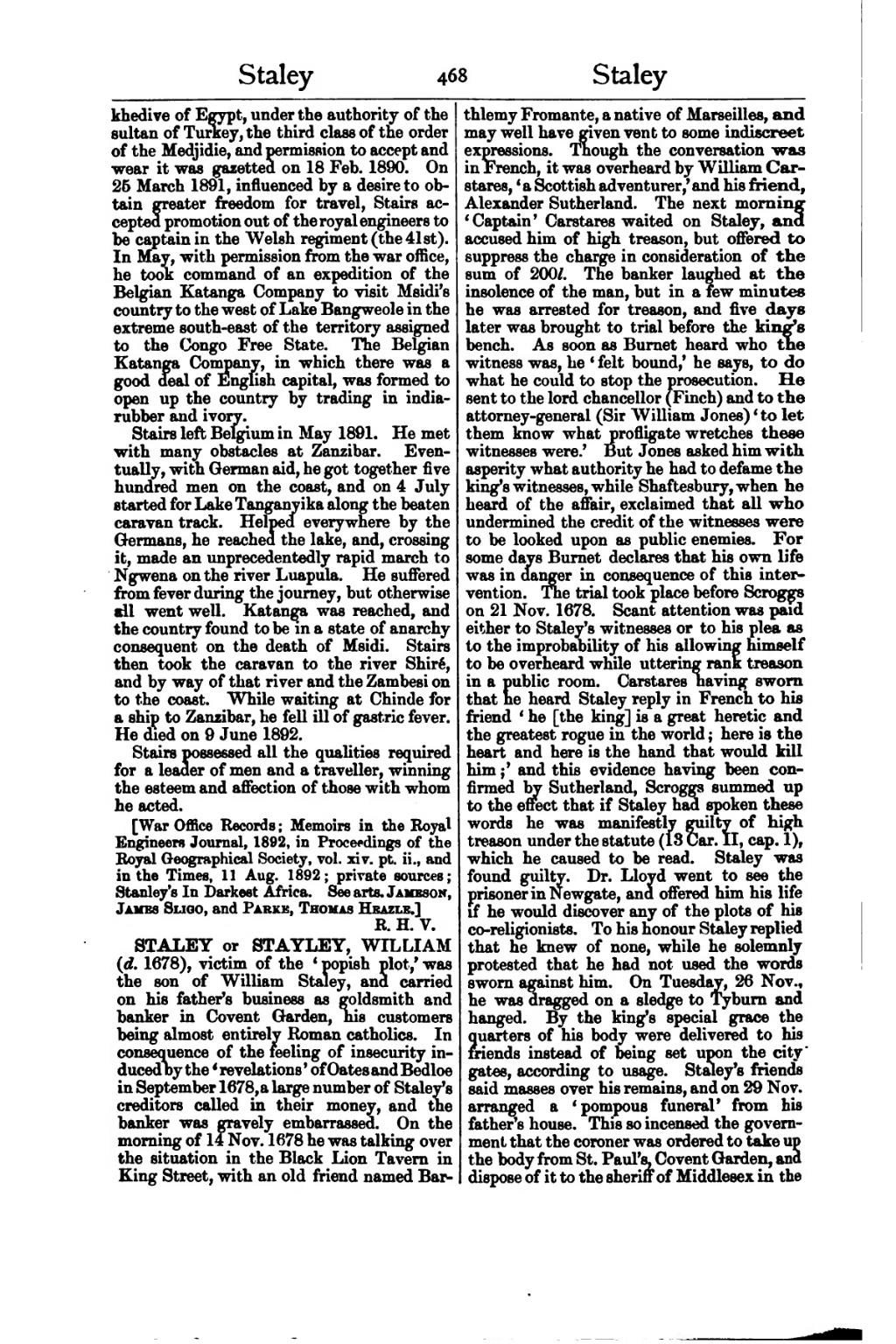khedive of Egypt, under the authority of the sultan of Turkey, the third class of the order of the Medjidie, and permission to accept and wear it was gazetted on 18 Feb. 1890. On 25 March 1891, influenced by a desire to obtain greater freedom for travel, Stairs accepted promotion out of the royal engineers to be captain in the Welsh regiment (the 41st). In May, with permission from the war office, he took command of an expedition of the Belgian Katanga Company to visit Msidi's country to the west of Lake Bangweole in the extreme south-east of the territory assigned to the Congo Free State. The Belgian Katanga Company, in which there was a good deal of English capital, was formed to open up the country by trading in indiarubber and ivory.
Stairs left Belgium in May 1891. He met with many obstacles at Zanzibar. Eventually, with German aid, he got together five hundred men on the coast, and on 4 July started for Lake Tanganyika along the beaten caravan track. Helped everywhere by the Germans, he reached the lake, and, crossing it, made an unprecedentedly rapid march to Ngwena on the river Luapula. He suffered from fever during the journey, but otherwise all went well. Katanga was reached, and the country found to be in a state of anarchy consequent on the death of Msidi. Stairs then took the caravan to the river Shiré, and by way of that river and the Zambesi on to the coast. While waiting at Chinde for a ship to Zanzibar, he fell ill of gastric fever. He died on 9 June 1892.
Stairs possessed all the qualities required for a leader of men and a traveller, winning the esteem and affection of those with whom he acted.
[War Office Records; Memoirs in the Royal Engineers Journal, 1892, in Proceedings of the Royal Geographical Society, vol. xiv. pt. ii., and in the Times, 11 Aug. 1892; private sources; Stanley's In Darkest Africa. See arts. Jameson, James Sligo, and Parke, Thomas Heazle.]
STALEY or STAYLEY, WILLIAM (d. 1678), victim of the ‘popish plot,’ was the son of William Staley, and carried on his father's business as goldsmith and banker in Covent Garden, his customers being almost entirely Roman catholics. In consequence of the feeling of insecurity induced by the ‘revelations’ of Oates and Bedloe in September 1678, a large number of Staley's creditors called in their money, and the banker was gravely embarrassed. On the morning of 14 Nov. 1678 he was talking over the situation in the Black Lion Tavern in King Street, with an old friend named Barthlemy Fromante, a native of Marseilles, and may well have given vent to some indiscreet expressions. Though the conversation was in French, it was overheard by William Carstares, ‘a Scottish adventurer,’ and his friend, Alexander Sutherland. The next morning ‘Captain’ Carstares waited on Staley, and accused him of high treason, but offered to suppress the charge in consideration of the sum of 200l. The banker laughed at the insolence of the man, but in a few minutes he was arrested for treason, and five days later was brought to trial before the king's bench. As soon as Burnet heard who the witness was, he ‘felt bound,’ he says, to do what he could to stop the prosecution. He sent to the lord chancellor (Finch) and to the attorney-general (Sir William Jones) ‘to let them know what profligate wretches these witnesses were.’ But Jones asked him with asperity what authority he had to defame the king's witnesses, while Shaftesbury, when he heard of the affair, exclaimed that all who undermined the credit of the witnesses were to be looked upon as public enemies. For some days Burnet declares that his own life was in danger in consequence of this intervention. The trial took place before Scroggs on 21 Nov. 1678. Scant attention was paid either to Staley's witnesses or to his plea as to the improbability of his allowing himself to be overheard while uttering rank treason in a public room. Carstares having sworn that he heard Staley reply in French to his friend ‘he [the king] is a great heretic and the greatest rogue in the world; here is the heart and here is the hand that would kill him;’ and this evidence having been confirmed by Sutherland, Scroggs summed up to the effect that if Staley had spoken these words he was manifestly guilty of high treason under the statute (13 Car. II, cap. 1), which he caused to be read. Staley was found guilty. Dr. Lloyd went to see the prisoner in Newgate, and offered him his life if he would discover any of the plots of his co-religionists. To his honour Staley replied that he knew of none, while he solemnly protested that he had not used the words sworn against him. On Tuesday, 26 Nov., he was dragged on a sledge to Tyburn and hanged. By the king's special grace the quarters of his body were delivered to his friends instead of being set upon the city gates, according to usage. Staley's friends said masses over his remains, and on 29 Nov. arranged a ‘pompous funeral’ from his father's house. This so incensed the government that the coroner was ordered to take up the body from St. Paul's, Covent Garden, and dispose of it to the sheriff of Middlesex in the
